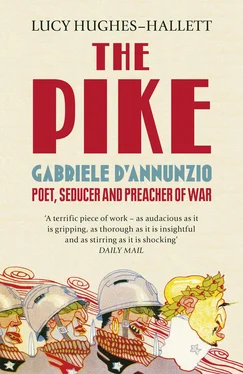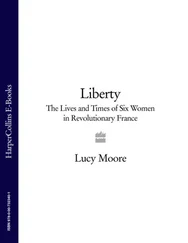‘All of these things,’ records Gide, ‘he said without any boastfulness, with gentle sweetness.’
The ability to conjure that same lulling sweetness which entranced Scarfoglio was a gift which never deserted d’Annunzio. Even those who know him well enough to perceive the indifference it masks, find it irresistible. ‘His face lights up in greeting you,’ writes one of his aides years later. ‘And you succumb! You have to succumb! In reality, he doesn’t give a damn!’
January 1901. Turin. In the five years since his encounter with Gide, d’Annunzio has written several plays and his most celebrated novel, and he has embarked on the exquisite sequence of lyric poems, Alcyone (Halcyon). He and Duse are living in adjacent houses in Settignano, in the hills above Florence, their every outing reported by the gossip columns, their incongruous appearance as a couple (Duse is nearly five years older and several inches taller than her lover) repeatedly caricatured.
D’Annunzio’s literary career is at its apogee, and he has begun his transition from poet to politician. In 1897 he contested and won an election in his native Abruzzi. In his electoral campaign he hymned the ‘politics of poetry’. Voted out of office after barely two years, he has been writing the poetry of politics, composing odes in an aggressive and nationalist vein. He is in Turin to give a public reading of the latest of them, a thousand-line tribute to Giuseppe Garibaldi.
Filippo Tommaso Marinetti is in Turin as a contributor to the Parisian journal Gil Blas. Marinetti, who will soon become better known as the impresario and spokesman of the futurist movement, is a prolific journalist. Quizzically, Marinetti observes d’Annunzio in his new role as public speaker. Il Vate, the bard, as he now likes to be styled, is thirty-eight, but he could be any age, or ageless. Tightly buttoned into his dark suit he looks like ‘a little ebony idol with a head of ivory’. His eyes ‘sharpened and electrified by the expectation of triumph’ are ‘strangely resplendent’. His face is ‘pale, dried, as though burnt by the fire of Ambition’. This is not an objective description. Marinetti is jealous of d’Annunzio, whom he sees as ‘corsetted by ambition and pride’. He sneers that ‘at all times and in all places Gabriele is dreaming of turning the world upside down with a well-turned phrase’. This is something Marinetti also dreams of doing, and so far d’Annunzio is proving better at it.
D’Annunzio takes his place on the platform, and begins his performance with, thinks Marinetti, the smugness of a cordon bleu chef lifting a lid to display a steaming dish of lentils. He reads very slowly, softly beating time with his fist on the table. His lips are preternaturally red: several contemporaries report that he uses make-up.
The recitation over (it takes an hour and a half) the crowd noisily acclaims him. He half rises to acknowledge the applause, bowing his head. Marinetti notices how the new-fangled electric light is brilliantly reflected off d’Annunzio’s shiny bald pate: a thoroughly modern nimbus for a machine-age hero.
1904, Settignano. Here is another view of d’Annunzio, this one by an anonymous lady whom he takes to bed one afternoon.
He is compulsively promiscuous. Within the last three years he has completed his immense poem-cycle, Laudi. His eight-year-long affair with Eleonora Duse is over and he is spending money more prodigally than ever before. His new lover, an aristocratic young widow, the Marchesa Alessandra di Rudinì, is dangerously ill. It is probably during one of Alessandra’s sojourns in hospital that the unknown lady arrives in response to an invitation with the pointed postscript, ‘I shall expect you alone’.
She is shown into a small sitting room crammed with roses. ‘They were everywhere – in vases, in amphorae, in bowls – and their petals were strewn on the carpets.’ D’Annunzio takes great care over dressing the set for his seductions. Outside the long windows a pergola covered with wisteria casts a mauve veil over the sunlight. The room is suffocatingly overheated, and the atmosphere is further laden with Acqua Nuntia, the scent d’Annunzio has concocted himself from a formula which he claims to have found in a fourteenth-century manuscript. He has had quantities of it made up by a chemist in Florence. It is bottled in Murano glass bottles (also made to the poet’s orders) and labelled (a lot of thought goes into the design of the labels).
The host appears, dressed in a dark blue kimono bordered with black. It is d’Annunzio’s habit to dress in this conveniently removable garment for an assignation and he always provides a kimono for his female visitor’s use. On a small ebony table a large silver tray has been set, bearing a samovar, two cups, and marrons glacés on silver plates. D’Annunzio pours the tea (Chinese, very fragrant), then seats himself crosslegged on the rug by the lady’s chair, takes both her hands in his and embarks upon his seduction. ‘From his gestures, from his voice, there came an invincible wave of desire which engulfed my whole being in an irresistible atmosphere of love.’ There are a number of descriptions of this process: d’Annunzio was a highly persuasive wooer. The anonymous lady feels herself swept ‘into mysterious spheres where there are no laws nor conventions’. Thus conveniently ‘drugged by the delicious poison of the Poet’s musical words’, she somehow swoons her way, without compromising herself by explicitly consenting to sex, into his bedroom.
Their transports ended, d’Annunzio leaves her. ‘A quarter of an hour later I found him in the library, turning the pages of a book.’ Without a word he escorts her to her carriage. She is driven away, feeling ‘the horrid sensation of being discarded like a toy’. On d’Annunzio’s orders, her carriage has been filled, ‘like a rich coffin’, with roses.
Summer 1906. D’Annunzio is in a palatial rented villa, a former home of the dukes of Tuscany, at the seaside near Pisa. His play La Figlia di Jorio (Jorio’s Daughter) has made him not just a literary star but also the voice of his people. ‘Evviva the poet of Italy!’ shouted the audience at its first night.
Alessandra is here, but she is addicted to morphine now and d’Annunzio is already writing daily to his new love, a Florentine countess. For the first time in nearly twenty years he has all three of his sons with him. In the mornings they box in an improvised ring on the beach. D’Annunzio gallops his horse through the pine woods, or swims, or paddles his brand new canoe – throwing himself into each activity with energy which astonishes the younger men. For lunch, served formally by some of the fifteen servants, he changes into a white linen suit, one of the hundred or so he has brought with him. He writes late into the night.
An aspiring poet, Umberto Saba, guest of d’Annunzio’s son Gabriellino, is our witness at this gathering. D’Annunzio, still physically trim at forty-three, greets Saba with exquisite courtesy. Flatteringly, he draws him away from the assembled company and out into the garden, where they sit down together on a stone bench. ‘He asked me, if I was not too tired from my journey, and if it would not be too much of a nuisance for me, to recite some of my poetry?’ This is the acme of Saba’s hopes. He can hardly believe his good fortune. He obliges. D’Annunzio is all compliments. He asks if he may recommend Saba’s work to his editor? Saba, overwhelmed by the great man’s generosity, is close to tears. Everything about the marvellous moment stays with him. Years later it will be as though he can still hear the pine needles creaking beneath their feet.
The conversation continues. There have only been three great poets in Italy, d’Annunzio says – Dante, Petrarch and Leopardi – before, that is, (and he repeats this twice) himself. Saba notices that the poet’s sons are not allowed to call him ‘Papa’. He requires them to address him as ‘Maestro’.
Читать дальше












